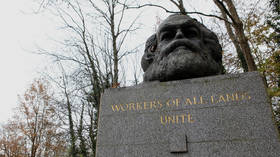The teachings of Marx are the best hope for UK's beaten-up working class

Karl Marx believed that creativity and toil should be equally distributed through society. This would be a good blueprint for broken Britain to follow, as it faces a recession that will hit its poorest hardest.
As summer comes to an end, so does the Government’s furlough scheme and the storm clouds are gathering over the United Kingdom. What comes next will be brutal.
The numbers of redundancies being announced every day can easily pass you by, but we must always remember that there is real misery behind each one. The future is shaping up to look truly bleak, and we have now officially entered into what will be a devastating recession.
Politicians are warning of the hardships to come, as if the last 20 years have been full of wealth and prosperity for all. But of course, they have not and, with the virus still among us, there is likely to be more misery in the coming winter months.
As an academic, my calendar starts in September when a new set of students walk through university doors wide-eyed and full of wonder. This September, I am uncertain what those students will be walking into. Yet it was only a few weeks ago we waved off our third-year graduates to a future that is offering very little, while those in their 20s and 30s are being made redundant at alarming rates. I can see a conveyor belt of competition as each generation has to turn on the other in order to survive.
The saddest element of all is that we have been here before, time and again. And it makes me wonder why society continually makes the same mistakes. Maybe it’s time to look back to look forward, and consider, for example, the words of Karl Marx.
Almost 200 years ago, Marx spoke and wrote about what makes a good society. He argued that arts, creativity and toil for the good of society should be equally distributed. Why can’t a person be both a fisherman and an artist, he argued.
This has to be a better blueprint to follow than what we are currently doing. And that will be borne out by what comes next, because I have lived through a crisis like this before and it is going to be ugly. In the late 1980s and early 1990s, mining and other industrial communities faced the same fate as we do today, with the past, the present and the future being swept away. Every age of man and boy was losing their incomes, and there was nothing else for them to turn to.
There was no plan for those being made redundant, and no care as to what would happen to them. Men in their 40s and 50s never worked again. Younger men and school leavers fought it out among each other for the next 10 years for what little work was available. Many left their communities; the 80s and 90s were desolate times for the working class in Britain.
And there wasn’t just one lost generation of school-leavers, there were, and still are, multiple lost generations of families, some which have not recovered. The women in these communities fared no better, as the factories that traditionally employed them moved their trade abroad; their competitors for work were on the other side of the world.
Also on rt.com UK’s plan to pump billions into broken housing system won’t help those weeks away from post-Covid homelessnessThis is a grim picture I am painting, and if I were to recount the personal and individual pains and struggles that I have witnessed it would be far grimmer. It is a horror story of addiction, suicide, poverty and hopelessness.
So now is the time to look back at those years with honesty, and to fiercely demand on the streets and in our communities, that no more of our people are allowed to be lost. There are solutions, and they were there in the 80s and 90s, but the governments of the day chose not to engage with them and instead use draconian welfare policy to punish people.
There are now many individuals who, through no fault of their own, are unemployed. There is no work. We can look to quick fixes and grandiose spivs to help out – such as the Amazonesque warehouse model and other satanic mills – or we can think seriously about the ideas of Marx, and introduce a New Deal for the arts and for education.
Working class communities are filled with richly creative people who can tell a story, in words and images and music. There are rich traditions in every working-class community, of debate, philosophy and the arts. However, they are not recognised for what they are and instead are devalued through a limited education system. What working class people do not have is the time, the resources and the opportunities to nurture their talents in a way that works for them.
This has never been an easy sell. Governments, policy makers and the politicians may all feel uncomfortable with making life appear easy for those not in work. Political speeches are often littered with aggressive language about ensuring worklessness shall be punished.
George Osborne’s words still ring in my ears as he told the country that he would no longer tolerate ‘those with the blinds closed living a life on benefits.’ Or what about Norman Tebbit in the 1980s, telling the country, in the midst of mass unemployment, that people needed to help themselves by getting on their bike to look for work? Or Tony Blair in the days after the 1997 election, when he stood outside the Aylesbury council estate in South London and told us there would be ‘no forgotten people,’ while his message to the 250,000 young people who were unemployed at the time was ‘work is the best welfare.’
None of this is new; we continue this cycle decade after decade when the root problems of the fair distribution of wealth and time and labour and resources are never tackled. Now is the time to follow Marx’s lead and attempt to change things for the better for everyone.
Instead of terrifying people with threats to their incomes or through a welfare system which is cruel and purposefully wears them down, we could bring hope and art and creativity and opportunity. We have the best universities in the world, but they have been long closed off to local people who want to retrain or get a new skill or just learn simply to enjoy the process of discovering knowledge.
Years ago, they became places not of learning, but of selling the commodity that is ‘the qualification.’ In this frightening new world that we are entering, this model of work and education is not adequate and will fail this generation and the next and the one after that.
In East London, opposite the Whitechapel Gallery, there used to stand an arts college. Students were mostly working-class locals: diverse and fizzing with creativity. The building was sold and demolished, and today on that site developers are building yet more luxury flats. Ironically, some are for wealthy overseas university students, who may not take up their places. In Nottingham, the university’s adult education centre was closed ten years ago and sold off and now is home to an insurance company.
In these grim times, universities, further education colleges, community centres, libraries and anywhere else that has space must open up and provide the time and resources so that working-class people of any age can learn and be part of their own knowledge creation, at no cost.
This would be not only instrumental in getting people off universal credit, but would allow them to contribute to society in every and any way they can, whether that is by telling stories through music, art, and words, and at the same time allowing them to earn a living that allows dignity. The working class should no longer be demeaned as exclusively the workhorses of Britain, but given a deal that allows them to be hopeful and creative.
The professional artists and creatives of today and yesterday are too often chosen and rise out of nepotism and privilege, but as Marx said, the distribution of labour should be of each according to their ability and to each according to their need. So, let our artists and creatives rise out of the satanic mills, the job centres and the council estates.
Think your friends would be interested? Share this story!
The statements, views and opinions expressed in this column are solely those of the author and do not necessarily represent those of RT.
















